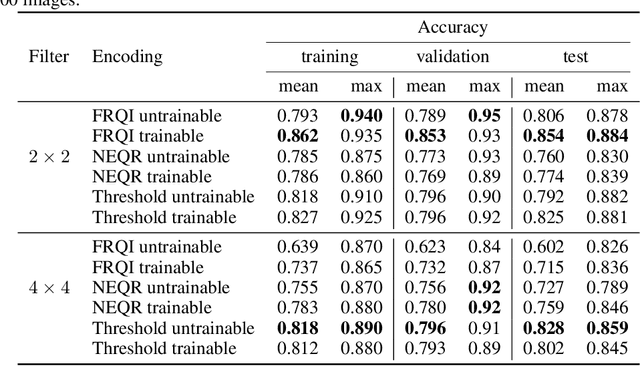Darya Martyniuk
Leveraging Diffusion Models for Parameterized Quantum Circuit Generation
May 27, 2025Abstract:Quantum computing holds immense potential, yet its practical success depends on multiple factors, including advances in quantum circuit design. In this paper, we introduce a generative approach based on denoising diffusion models (DMs) to synthesize parameterized quantum circuits (PQCs). Extending the recent diffusion model pipeline of F\"urrutter et al. [1], our model effectively conditions the synthesis process, enabling the simultaneous generation of circuit architectures and their continuous gate parameters. We demonstrate our approach in synthesizing PQCs optimized for generating high-fidelity Greenberger-Horne-Zeilinger (GHZ) states and achieving high accuracy in quantum machine learning (QML) classification tasks. Our results indicate a strong generalization across varying gate sets and scaling qubit counts, highlighting the versatility and computational efficiency of diffusion-based methods. This work illustrates the potential of generative models as a powerful tool for accelerating and optimizing the design of PQCs, supporting the development of more practical and scalable quantum applications.
Quantum Architecture Search: A Survey
Jun 10, 2024



Abstract:Quantum computing has made significant progress in recent years, attracting immense interest not only in research laboratories but also in various industries. However, the application of quantum computing to solve real-world problems is still hampered by a number of challenges, including hardware limitations and a relatively under-explored landscape of quantum algorithms, especially when compared to the extensive development of classical computing. The design of quantum circuits, in particular parameterized quantum circuits (PQCs), which contain learnable parameters optimized by classical methods, is a non-trivial and time-consuming task requiring expert knowledge. As a result, research on the automated generation of PQCs, known as quantum architecture search (QAS), has gained considerable interest. QAS focuses on the use of machine learning and optimization-driven techniques to generate PQCs tailored to specific problems and characteristics of quantum hardware. In this paper, we provide an overview of QAS methods by examining relevant research studies in the field. We discuss main challenges in designing and performing an automated search for an optimal PQC, and survey ways to address them to ease future research.
Hybrid Quantum Machine Learning Assisted Classification of COVID-19 from Computed Tomography Scans
Oct 04, 2023



Abstract:Practical quantum computing (QC) is still in its infancy and problems considered are usually fairly small, especially in quantum machine learning when compared to its classical counterpart. Image processing applications in particular require models that are able to handle a large amount of features, and while classical approaches can easily tackle this, it is a major challenge and a cause for harsh restrictions in contemporary QC. In this paper, we apply a hybrid quantum machine learning approach to a practically relevant problem with real world-data. That is, we apply hybrid quantum transfer learning to an image processing task in the field of medical image processing. More specifically, we classify large CT-scans of the lung into COVID-19, CAP, or Normal. We discuss quantum image embedding as well as hybrid quantum machine learning and evaluate several approaches to quantum transfer learning with various quantum circuits and embedding techniques.
Variational Quanvolutional Neural Networks with enhanced image encoding
Jun 23, 2021



Abstract:Image classification is an important task in various machine learning applications. In recent years, a number of classification methods based on quantum machine learning and different quantum image encoding techniques have been proposed. In this paper, we study the effect of three different quantum image encoding approaches on the performance of a convolution-inspired hybrid quantum-classical image classification algorithm called quanvolutional neural network (QNN). We furthermore examine the effect of variational - i.e. trainable - quantum circuits on the classification results. Our experiments indicate that some image encodings are better suited for variational circuits. However, our experiments show as well that there is not one best image encoding, but that the choice of the encoding depends on the specific constraints of the application.
 Add to Chrome
Add to Chrome Add to Firefox
Add to Firefox Add to Edge
Add to Edge